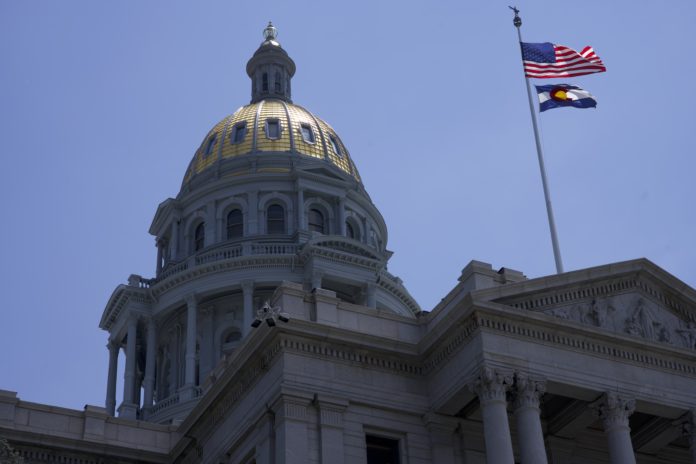
Two Colorado House of Representatives members are accusing their colleagues of routinely breaking the Colorado Open Meetings Law in a lawsuit filed last Friday.
The July 7 complaint was filed in Denver District Court by freshman Democratic Reps. Elisabeth Epps and Robert Marshall and names Democratic Reps. Julie McCluskie, Monica Duran and Republican Rep. Mike Lynch, who all hold leadership roles in the House of Representatives, as well as the Democrat and Republican House Caucuses as defendants.
The lawsuit accuses members of the House of Representatives of “routinely meet[ing] in secret to discuss public business” in violation of the Colorado Open Meetings Law. “These discussions inform the course of legislative action to be later taken publicly and are routinely conducted outside of public view, without providing public notice, and without recording or publishing meeting minutes that the public can access,” the complaint states.
Epps and Marshall are being represented by attorney Steve Zansberg.
The Colorado Open Meetings Law, also called the Sunshine Law, was passed by the General Assembly in 1972 and requires state public bodies, including the General Assembly, to meet certain requirements ahead of meetings of two or more officials who gather to discuss public business. Those requirements include providing public notice of a meeting and maintaining and making records public. The law applies to traditional meetings as well as communications, such as email or messages, that are considered gatherings.
In the complaint, Marshall and Epps accuse the Democrat and Republican House Caucuses of regularly meeting to discuss upcoming legislation behind closed doors and concealing these meetings from the public. They also accuse their colleagues of using the encrypted messenger service Signal to communicate with each other about public business. Those messages are set to automatically delete themselves and aren’t made public, according to the lawsuit’s allegations.
The legislators say they learned about these meetings and the use of Signal shortly after they were sworn in earlier this year. They also claim to have been put in a Catch-22 by their colleagues: join the meetings and break the Open Meetings Law or miss out on important policy discussions with their colleagues.
Epps and Marshall in the lawsuit claim to have brought concerns about non-compliance with Colorado’s Sunshine Law to McCluskie, the speaker of the house, and say they were told these concerns would be addressed. The lawmakers said they filed the lawsuit after House leadership failed to change these practices.
In the lawsuit, Epps and Marshall are asking a court to find these meetings and communications violated Colorado’s Open Meetings Laws and enjoin members from breaking them in the future.
In a July 10 statement, Colorado House Republicans Deputy Chief of Staff Roger Hudson characterized the lawsuit as “infighting” and a “distraction.”
“This lawsuit is what Coloradans hate about politics at the Capitol. The infighting and expense is only a distraction to the priorities that they care about; improved schools, safer communities, more jobs at higher wages, and better roads throughout our state,” said Hudson in the statement. “Republicans continue to believe that the people of Colorado deserve access to their government through comprehensive open meetings and open records laws — we welcome any conversation that will update our statutes to keep up with rapidly evolving technology.”
The case is Epps v. Colorado House of Representatives.

